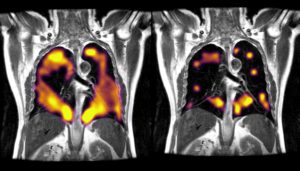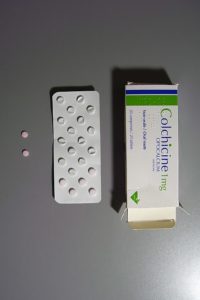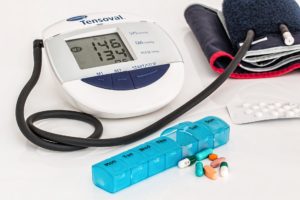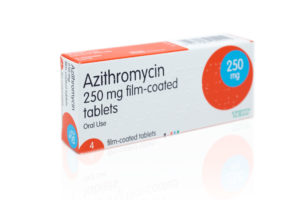Clinicians and engineers in Oxford have begun using artificial intelligence alongside endoscopy to get more accurate readings of the pre-cancerous condition Barrett’s oesophagus and so determine patients most at risk of developing cancer. In a research paper published in the journal ... READ MORE
AI detects life-threatening blood vessel inflammation from COVID-19 variants
New artificial intelligence (AI) technology to scan for heightened blood vessel inflammation can calculate a person’s risk of death from COVID-19 and COVID-19 variants. The technology could be used to tailor their treatment and give them the best chance of recovery, according to new research ... READ MORE
Blog: Identifying policy implications of personal genetic health information
Oxford BRC researcher, Dr Liz Ormondroyd, explains how she has been working with fellow academics and the UK Parliamentary Office of Science and Technology to identify policy implications of genomic health information. Genetics and genomics are increasingly in the news. People can buy genetic ... READ MORE
Artificial intelligence tool for streamlining pathology workflow
A multidisciplinary team comprising University of Oxford academics and Oxford University Hospitals (OUH) pathologists has developed an algorithm that automates requests for additional investigation of diagnostically uncertain prostate biopsies. The team were supported by the NIHR Oxford BRC ... READ MORE
New trial PROMises hope for patients affected by myelofibrosis
A new clinical trial has been launched to offer a novel treatment option for patients with the blood cancer myelofibrosis (MF). The PROMise trial, launched by the Cure Leukaemia-funded Trials Acceleration Programme, will involve patients aged 16 or over at 15 NHS centres, including Oxford’s ... READ MORE
Study investigates whether digital technologies can help reduce loneliness
An Oxford BRC study has found that digital technology interventions are not effective for reducing loneliness in older adults. From 4939 screened articles, the authors reviewed six research papers on digital technology interventions for loneliness in a systematic review and meta-analysis ... READ MORE
Study confirms longer-term lung damage after COVID-19
A study by Oxford and Sheffield researchers using a cutting-edge method of imaging has identified persistent damage to the lungs of COVID-19 patients at least three months after they were discharged from hospital, and for some patients even longer. This damage was not detected by routine CT ... READ MORE
Trial finds no benefit from using colchicine in hospitalised COVID-19 patients
The RECOVERY Trial, the world’s largest randomised trial of potential COVID-19 treatments, has found no evidence that that the drug colchicine has any meaningful clinical benefits for patients hospitalised with COVID-19. Colchicine is used to treat inflammation and pain in ... READ MORE
Partnership to speed up identification of COVID-19 variants
Oxford University and the multinational computer technology corporation Oracle have joined forces to create a Global Pathogen Analysis System (GPAS) to help governments and medical communities identify and act on variants of the COVID-19 virus faster. The emergence of more infectious ... READ MORE
BRC researcher receives national infection prevention award
An NIHR Oxford Biomedical Research Centre researcher who has played a leading role in Oxford University Hospitals (OUH) NHS Foundation Trust’s COVID-19 staff testing programme is to receive a national award. Dr David Eyre (pictured) has been named as the recipient of the Healthcare Infection ... READ MORE
Having a healthier heart associated with better problem-solving and reaction time
People with healthier heart structure and function appear to have better cognitive abilities, including increased capacity to solve logic problems and faster reaction times, according to a study involving University of Oxford and Queen Mary University of London (QMUL) researchers. The study, ... READ MORE
Messaging focused on personal rather than collective benefits more effective for COVID-19 vaccination
The largest ever study of COVID-19 vaccine messaging shows that emphasising the personal benefits of vaccination may be the most effective way to persuade people who are sceptical about the jab. For the one in ten who say they won't take a COVID-19 vaccine, messaging that focuses on personal ... READ MORE
Oxford BRC researchers named among new Academy of Medical Sciences fellows
A number of leading researchers supported by the NIHR Oxford Biomedical Research Centre are among 50 prominent biomedical and health scientists elected to the Academy of Medical Sciences’ respected and influential Fellowship. The new Fellows include Oxford BRC experts who have spearheaded the ... READ MORE
Data reveals COVID-19 risk factors for people with type 1 diabetes
The largest study of people with type 1 diabetes admitted to hospital with COVID-19 has found that those with higher body mass index (BMI), poorer kidney function and the presence of microvascular complications were at greater risk of death and/or admission to intensive care. However, the ... READ MORE
Study reveals three most important aspects of care for hip fractures
Older patients with hip fractures recover better if they receive treatment under the supervision of both a surgeon and a specialist in elderly care; are checked to avoid future falls; and are assessed for memory problems. These are the findings of the World Hip Trauma Evaluation (WHiTE) study, ... READ MORE
Foods linked to greater risk of cardiovascular disease and death in middle-age identified
Two common dietary patterns identified in British adults may be associated with an increased risk of cardiovascular disease and death in middle-age, according to a study by Oxford University researchers. The research, which was supported by the NIHR Oxford Biomedical Research Centre, was ... READ MORE
More people could benefit from blood pressure-lowering medication, study finds
Blood pressure-lowering medication can prevent serious cardiovascular conditions such as strokes, heart failure and heart attacks, even in adults with normal blood pressure, according to a new research by University of Oxford researchers In a paper published in the Lancet, the researchers found ... READ MORE
Study highlights role of BMI in increased COVID-19 risks
A study by University of Oxford researchers has found that the risk of admission to hospital, admission to ICU or death from COVID-19 increases progressively above a ‘normal’ BMI of 23, even without other comorbidities. The research team, who are supported by the NIHR Oxford Biomedical Research ... READ MORE
Study challenges idea of clinically significant mid-pregnancy drop in blood pressure
An international study involving NIHR Oxford BRC researchers has shown where normal blood pressure in pregnancy should be across the world and when clinicians should react because it is abnormal. The study’s findings, published in PLOS Medicine, provide international, gestational age-specific ... READ MORE
Azithromycin not effective against COVID-19, trial confirms
A clinical trial by University of Oxford researchers has confirmed that the antibiotic azithromycin has no clinical benefit in people with moderate COVID-19. The ATOMIC2 trial, which was supported by the NIHR Oxford Biomedical Research Centre (BRC), was established to investigate if a common ... READ MORE
- « Previous Page
- 1
- …
- 15
- 16
- 17
- 18
- 19
- …
- 48
- Next Page »



















